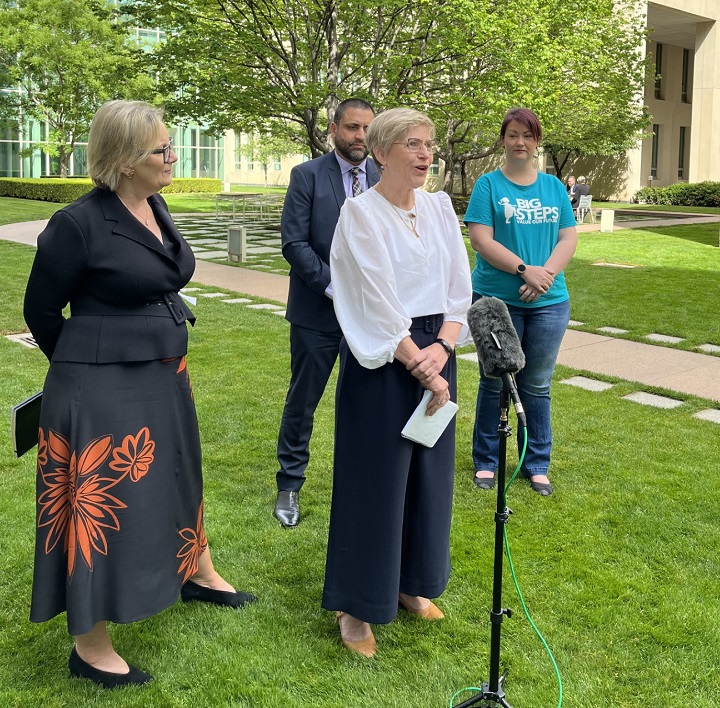What is multi-employer bargaining and what is Community Child Care Association's role?
Multi-employer bargaining (MEB) is a process that allows workers in the same industry, but spread across multiple employers, to negotiate better pay and conditions as a group.
In late 2022, new laws passed that made multi-employer bargaining possible for our sector – and we saw an opportunity to finally achieve fair pay for educators. We quickly got to work as part of a group of other peaks and unions negotiating the first-ever deal of this kind with the government.
In August 2024, the Australian Government made a 3.6 billion dollar commitment to a pay rise for educators and teachers!
Following years of advocacy, educators will finally have pay that better reflects the importance of their work. It’s a big step towards achieving access to high-quality education and care for children across Australia and we are proud to have been one of four sector representatives negotiating this landmark deal.
How can I access the pay increase for teachers and educators at my children’s service?
To access the government's 15% pay rise for educators and teachers, providers must meet specific conditions.
Our workplace relations service is ready to guide you through every step of the process. We'll help you to navigate the grant requirements, including ensuring your workplace instrument is compliant.
Have questions specific to your service? Call us on 1300 346 818.
Get the expert support you need to access the worker retention payment
Why is multi-employer bargaining for early childhood needed?
Tens of thousands of Australian children are missing out on quality early education and care. Low pay and poor conditions mean early childhood educators are leaving in droves and many children’s services are being forced to turn parents away. With multi-employer bargaining, we can improve wages and solve staffing shortages without increasing childcare costs for parents. This first agreement will set the sector up to continue to negotiate for better wages and conditions into the future.
What are the benefits of multi-employer bargaining for early childhood?
- Early childhood educators and teachers will be paid a fair wage that reflects their qualifications, skills and responsibilities
- Education and care providers can recruit and keep qualified staff, ensuring more families can participate in the workforce and fewer children will miss out on the proven benefits of early education
- The government funds the pay rise, meaning the cost won’t be passed on to families.
What was the multi-employer bargaining process that led us to this historic deal?

CCC Executive Director Julie Price at a Canberra press conference
- December 2022: The Australian Government passed its Secure Jobs, Better Pay Act, making it possible for early childhood services to bargain (negotiate better pay) together as a group
- June 2023: We, along with other peaks and unions, applied to the Fair Work Commission to negotiate under the new laws
- August 2023: At the Fair Work Commission, we obtained permission to proceed with the multi-employer bargaining process for early childhood services
- Early September 2023: We, along with two of our members, flew to Canberra to participate in a roundtable, presenting the case for multi-employer bargaining to the federal government
- Mid September 2023: We were given permission to bargain by the Fair Work Commission
- May 2024: The federal government committed to fund a pay increase for long day care educators and teachers
- August 2024: The Australian Government confirmed it would fund a fifteen per cent pay rise for educators and teachers in a 3.6 billion dollar commitment
- November 2024: CCC, unions and other sector representatives signed the multi-employer agreement with the government.
Keep an eye on Facebook and LinkedIn for updates or subscribe for pay rise news.

Julie Price signs multi-employer agreement with the government
Frequently asked questions
What did you ask the government?
We asked the government to fund a wages deal to fix the wage gap between education and care and other government-funded sectors, like aged care and teachers.
Will educators in outside school hours care services (OSHC) get the pay rise?
The Australian Government’s funding commitment is for educators and teachers in eligible Child Care Subsidy (CSS)-approved centres that meet certain conditions, including limiting fee increases and engaging staff through a workplace instrument.
Get the expert support you need to access the worker retention payment
The government says it will consult with the family day care and in home care sectors to understand how support can be extended to their workforce.
My centre has a current enterprise agreement – what do I do?
We can help your service ensure its current agreement is equivalent and therefore able to attract government funding.
What is happening for Professional Childcare Standard services?
The Professional Childcare Standard (PCS) is an existing multi-employer agreement for community-managed long day care services in Victoria. The PCS currently includes some of the best pay and conditions offered for educators working in the community long day care sector.
To ensure PCS services are best placed to receive any funding from the government while maintaining its premium pay and conditions, we're working to ensure the new agreement aligns with the national process.
We will keep PCS services informed of the national process – you'll be provided with all the information you need to understand your options and how you can benefit from government funding as soon as the details are finalised.
What is the difference between the award and a workplace agreement through multi-employer bargaining?
Awards are the legal minimum wages and conditions for employees in a specific industry. Workplace agreements sit above awards and must contain wages and conditions that are better than minimum award standards. Employers and employees make workplace agreements by directly negotiating together, either in a single workplace or across multiple employers. In this case, CCC and other sector representatives and unions have negotiated a workplace agreement to be funded by government on behalf of multiple separate employers.
Have questions specific to your service? Call us on 1300 346 818.
